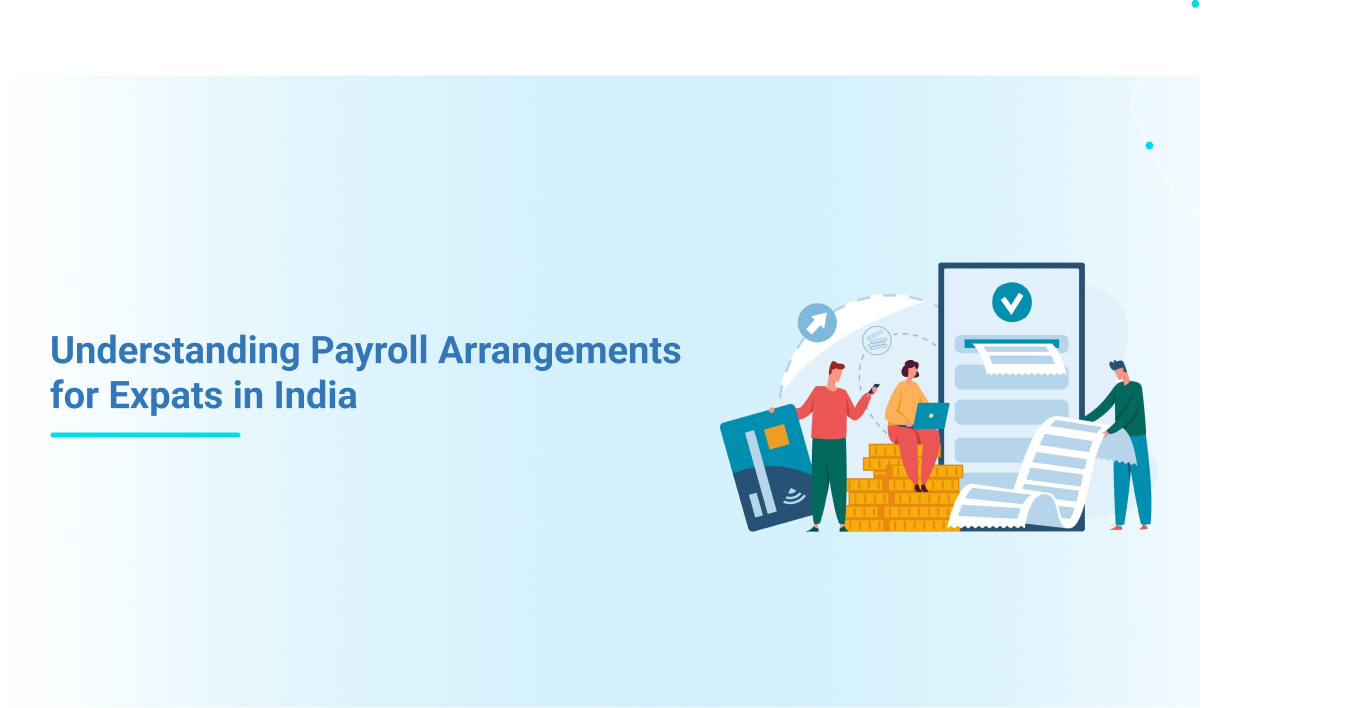Understanding Payroll Arrangements for Expats in India

As globalisation continues to shape the business landscape, cross-border employee movements have emerged as a strategic priority for many organisations. With companies expanding their international operations, the mobility of skilled professionals have increased, providing expatriates with opportunities to gain diverse experiences while maintaining continuity in home-country payroll for social security contributions and fulfilling family obligations. Host companies often offer perks and benefits that match the expatriate's home-country living standards, allowing them to quickly adapt to the host country's lifestyle and work environment.
Payroll structuring for expatriates is typically influenced by the duration and nature of the assignment, with employers striving for operational efficiency and simplified administration while also catering to the employee’s compensation preferences. However, the complexities surrounding payroll go beyond these primary considerations and can significantly impact the overall success of the assignment.
In this article, we will explore the various payroll arrangements commonly used in secondments and highlight the critical payroll factors that must be addressed to ensure a seamless and compliant secondment.
Summary
Different Payroll Arrangements
When managing expatriates on international assignments, companies adopt different payroll arangements for expats in India to meet both operational requirements and employee preferences. Below are three common arrangements explained through real-world scenarios:
| Case 1: Home Payroll | Case 2: Split Payroll | Case 3: Host Payroll |
|---|---|---|
| John, a US national working for a New York-based company, is seconded to its Indian arm in Mumbai for a short assignment. To avoid administrative complexities and accommodate John's financial obligations back home, his payroll is retained by the home entity. | James, a consultant for a UK-based firm, is seconded to India on a two-year assignment. While he continues to receive his salary from the UK entity, all assignment-related allowances and benefits are provided locally in India by the Indian subsidiary. | Jean, a Senior Software Architect at a French tech company, is appointed as Chief Technology Officer to lead the Indian subsidiary’s technology team. Due to the strategic and long-term nature of his assignment, the company localises Jean with the Indian entity. His salary, benefits, and taxes are now fully managed by the Indian entity, effectively cutting off employment ties with the French entity. |
| Shadow Payroll by Indian Entity: | Shadow Payroll by Indian Entity: | Local Payroll by Indian Entity: |
| To comply with Indian tax and social security regulations, the Mumbai office operates a shadow payroll. This ensures that local taxes and social security contributions are accurately calculated and deposited in compliance with Indian laws. | In addition to providing the allowances and benefits, the Indian entity also factors in the home-country salary to accurately assess and deposit taxes and social security contributions on the combined compensation in India. | No shadow payroll is required since Jean’s entire compensation is managed locally, simplifying administration and ensuring full compliance with local tax and employment law |
While each payroll arrangement offers distinct advantages, implementation can sometimes be complex. A common administrative challenge is the intracompany settlement of payroll costs when the home entity retains payroll but charges these costs back to the host entity through intracompany reimbursements.
When secondments are well-structured where the host entity is clearly recognised as the expatriate's economic employer — both in documentation and substance — intercompany settlement becomes relatively straightforward. However, if employment ties with the home entity are not fully severed, the settlement process can become more complicated. Authorities may view the intracompany settlement as a service provided by the home entity to the host entity through its employees, potentially triggering tax withholding and GST (VAT) liabilities.
Effective planning and execution are crucial to ensure compliance and avoid these complications while maintaining employee satisfaction.
To better understand how these payroll structures function, the pros and cons of each payroll arrangement are summarised below.
| Payroll Arrangement | Pros | Cons |
|---|---|---|
| Home Payroll & Split Payroll |
|
|
| Host Payroll / Localisation |
|
|
Key Considerations in Expatriate Payroll Structuring: Beyond Operational Choices
When structuring payroll for expatriates, companies must consider more than just operational preferences like home, host, or split payroll. Various external factors and regulatory frameworks heavily influence the optimal approach. Key considerations include:
1. Immigration Regulations
Some Indian embassies, including those in Germany and Hong Kong, require expatriates to be remunerated locally by the Indian entity sponsoring their visa. While the salary threshold for employment visas remains USD 25,000, split payroll can still be an option if local remuneration is ensured. Similarly, Bangladesh's BIDA mandates that expatriates receive payment through a local bank account to extend work permits. These regulations highlight the importance of aligning payroll with local laws to avoid visa complications.
2. Expatriate Satisfaction and Retention
Maintaining an expatriate’s standard of living is critical to assignment success. Dissatisfaction with local benefits or compensation is one of the primary reasons expatriates leave assignments early. Surveys show that 25-30% of expatriates who exit assignments prematurely cite dissatisfaction with local benefits as a key factor. Companies must balance administrative efficiency and costs while meeting expatriates' expectations for housing, schooling, healthcare, and other benefits. Offering compensation packages that match home-country standards can help reduce turnover and improve assignment outcomes.
3. Long-Term Financial Stability
Expatriates' long-term financial stability depends on consistent contributions to social security, pensions, and retirement plans. While localising payroll simplifies administration, it can lead to the loss of home-country social security contributions, affecting the expatriate’s financial future. Companies need to carefully assess how localisation impacts long-term financial planning and may need to provide supplemental benefits or maintain home-country pension contributions to secure expatriates’ financial well-being during and after their assignments.
Conclusion
Expatriate payroll structuring is more than just selecting between home, host, or split payroll. Immigration regulations, tax obligations, and employee satisfaction are critical factors that must be carefully considered. For companies sending employees to India, recent changes in visa requirements, local payroll obligations, and other statutory regulations add new layers of complexity.
At Expat Orbit, we help businesses navigate these challenges by offering tailored payroll solutions that ensure compliance while safeguarding expatriates' financial stability.
FAQs
Q: How does the duration and nature of the assignment impact payroll structuring for expatriates?
A: The duration and nature of the assignment can influence the payroll arrangement chosen for expatriates. Short-term assignments may utilize home or split payroll arrangements, while longer, strategic assignments may require localization with the host entity.
Q: What is a shadow payroll?
A: A shadow payroll refers to the process of calculating and reporting local taxes and social security contributions for an employee who is paid through a foreign entity.
Q: What is the difference between home, split, and host payroll?
A:
- Home payroll: The expatriate’s salary is managed by their home entity.
- Split payroll: The salary is divided between the home and host entities.
- Host payroll: The expatriate’s salary and benefits are managed by the host entity.
Q: How does a shadow payroll ensure compliance with local tax and social security regulations?
A: A shadow payroll ensures compliance by accurately calculating and depositing local taxes and social security contributions in accordance with the host country’s laws.
Q: What factors should be considered when determining the most suitable payroll arrangement for an expatriate?
A: Key factors include the duration and nature of the assignment, local tax and social security regulations, the employee's compensation preferences, administrative efficiency, and the strategic goals of the assignment.
Q: How do immigration regulations impact expatriate payroll?
A: Immigration regulations, such as those in India, may require expatriates to be remunerated locally by the sponsoring entity, which influences the decision between home, host, or split payroll.
Q: Why is expatriate satisfaction and retention important for payroll structuring?
A: Satisfaction with local benefits and compensation is vital for retaining expatriates. Companies must balance costs and administrative efficiency with meeting expatriates’ expectations to ensure assignment success.
Q: How does localizing payroll affect expatriates’ long-term financial stability?
A: Localizing payroll may impact the expatriate’s financial future by reducing home-country social security contributions. Employers may need to offer supplemental benefits or maintain home-country pension contributions to protect their financial well-being.
Q: How can Expat Orbit assist with expatriate payroll structuring?
A: Expat Orbit provides tailored payroll solutions that ensure compliance with immigration regulations and protect expatriates' long-term financial stability. We help businesses navigate the complexities of expatriate payroll in countries such as India.
